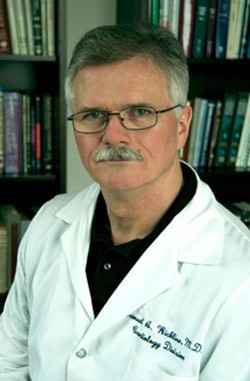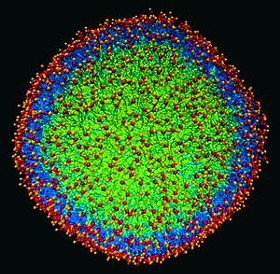We've known for years now that unprotected sex can lead to both pregnancy and sexually transmitted diseases, including HIV. We've also known that condoms do a pretty good, but by no means perfect, job of blocking sperm and the HIV virus. But Dr. Sam Wickline of Washington University Medical School has proposed a radical new way of preventing both pregnancy and disease: not by blocking sperm and viruses, but by killing them.
This month Wickline won a $100,000 Grand Challenges Explorations grant from the Bill and Melinda Gates Foundation that will fund the development of a new vaginal antiviral contraceptive gel. Wickline's gel will contain nanoparticles that will target both sperm and HIV and deliver a toxic bee venom that will incapacitate both the cell and the virus.
"Sperm and HIV are remarkably similar in their natural mechanism of genetic transmission," Wickline said in a press release. "Both need to fuse with their target cell in order to deliver their genetic payloads -- DNA in the case of sperm, and RNA in the case of HIV."
The nanoparticles in the gel are synthetic lipids, or fats, created by Wickline and his Wash. U. colleague Dr. Gregory Lanza. They will act as decoys to attract sperm and HIV. When the sperm or virus fuses with the nanoparticles to deliver its DNA or RNA, the nanoparticles will transfer a toxin called melitten that will destroy the sperm of the virus by poking holes in the cell membrane.
Melitten is derived from the venom of the honeybee; hence, the nanoparticles are known as "nanobees."
Of course, there's the problem of how to make sure the nanobees attack only sperm cells and HIV, not other useful cells. Wickline and a colleague, Dr. Paul Schlesinger, tackled this problem two years ago by adding molecules to the nanobees that will bind with receptors only on the target cells.
The nanobees are also too large to leave the vaginal vault and travel to other parts of the body.
Wickline's lab will be working with Kereos, Inc., a St. Louis-based biotech company which Lanza co-founded, to expand the nanobee technology to kill cancer cells.
Grand Challenges Explorations funds research projects to improve global health. Wickline's contraceptive gel would especially benefit women in sub-Saharan Africa, who accounted for 68 percent of new HIV cases in 2008 and have the world's highest fertility rate, with an average of 5.6 children.
Wickline was one of 65 scientists selected for the grant program this month. If he's successful, the Gates Foundation will increase the amount of grant money to up to $1 million.
At least two other labs in the U.S. and Canada are working on similar projects to target and destroy HIV and sperm simultaneously. One proposes using bacteria, the other proteins.







